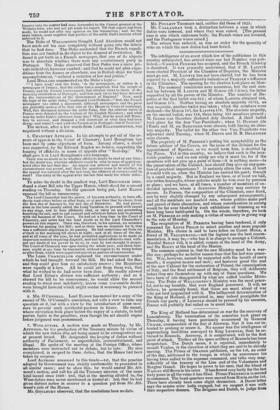The intelligence of an event which few of the politicians
in this country anticipated, has arrived since our last Number was pub- lished,—CASIMIR PERRIER has resigned, and the French Ministry is dissolved. It was generally understood, that if M. LAFITTE were elected President of the Chamber of Deputies, the Minister must go out. M. LAFITTE has not been elected, but he has been rejected by a majority sufficiently indicative of PERRIER'S influence in the Chamber. The meeting for the election took place on Mon- day. The nominal candidates were numerous, but the real con- test lay between M. LAFITTE and M. GIROD (de l'Aine), the latter supported by all the power of the Minister. The number of De- puties at the first ballot was 355 ; of whom LAFITTE obtained 168, and GIROD 171. Neither having an absolute majority (178), as was requisite, another ballot was taken ; when the numbers were declared—for GIROD 181, for LAFITTE 176. The absolute majority, on the second ballot, was 180, there being 358 members present ; M. GIROD was therefore declared duly elected. A third ballot took place for the four Vice-Presidents ; when M. DUPONT (de l'Eure) and M. DE BERENGER were chosen, both having an abso- lute majority. The ballot for the other two Vice-Presidents was adjourned until Tuesday, when M. DUPIN and M. B. DELESSERT were chosen.
The propriety of M. PERRIER'S putting his acceptability as the future adviser of the Crown, on the issue of the division for the appointment of Speaker, as we would term him, is doubted by the Times. Yet in this country, we believe that such is the inva- riable practice ; and we can easily see why it must be, for if the members will not give up a point of form—it is nothing more—to the preservation of the Cabinet, how should they give up any ques- tion of practical importance ? It certainly alters the case, at least it would with us, when the Minister has carried his point, though by a small majority. But in England we have, or at least we had, our rotten boroughs, whose patrons might be won over by pension or place; and we have, at all times, a number of members of un- decided opinions, whom a dexterous Ministry may contrive to secure. in France, the composition of the Chamber, once fixed, can be very slightly changed by any subsequent arrangements; and all the members are marked men, whose politics make part and parcel of their characters, and whose consideration in society would be for ever blasted by such exhibitions of trimming as we have long been habituated to. On the whole, therefore, we look on M. PERRIER as only making a virtue of necessity in giving way to the vote of Monday. The resignation of M. PERRIER having been tendered, it only remained for LOUIS PHILIP to select another and more popular Minister. His choice is said to have fallen on Count MOLE, a friend of M. TALLEYRAND,=110t the highest nor the best recom- mendation, it may be,—who has it in charge to arrange a Cabinet. Marshal SOULT will, it is added, remain at the head of the Army, and DE RIGHT at the head of the Marine.
The common opinion is, that the new Ministry must be a war- like one ; perhaps for no better reason than that the last was peace- ful. War, however, cannot be supported with the breath of one's mouth ; it requires means and men ; and however great the zeal of the new Cabinet for the restoration of Poland, the emancipation of Italy, and the final settlement of Belgium, they will deliberate before they mix themselves up with any of these questions. We have been of late disappointed by what are called warlike Minis- tries. The Duke of WELLINGTON'S Ministry was the most peace- ful, not to say humble, that ever England possessed. It will, we believe, be generally found, that those are most afraid of war who are best acquainted with it. The belligerent determination of the King of. Holland, if persisted in, may indeed precipitate the French war party ; if LEOPOLD should be pressed by his enemies, France will probably feel called on to assist him.


























 Previous page
Previous page